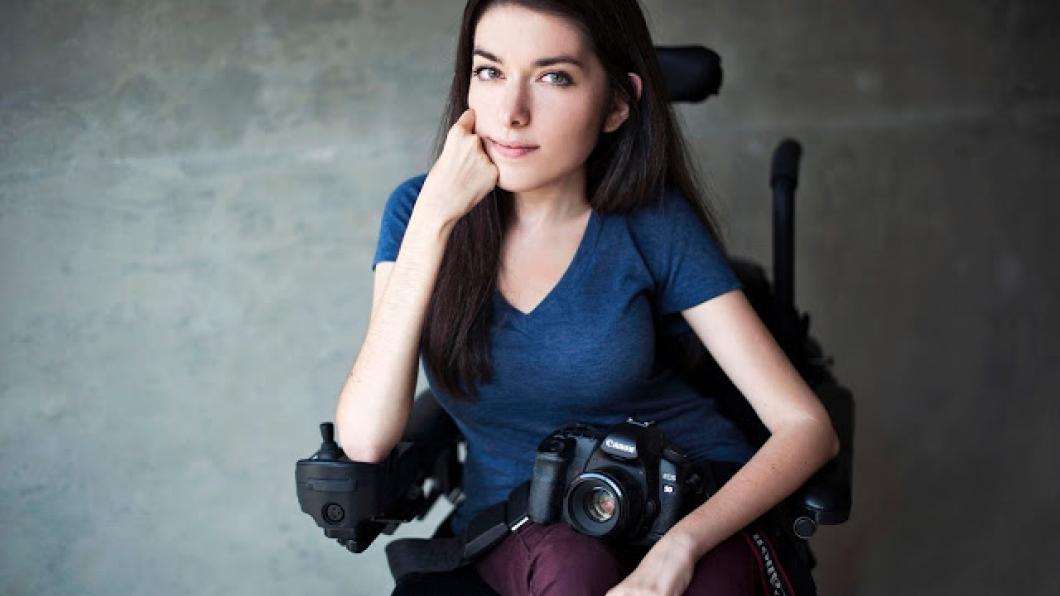
Focused on access: Photographer launches new app
By Louise Kinross
Maayan Ziv found her life passion by accident.
After landing in New York on a high school trip, her power wheelchair broke down.
She couldn’t keep up with the jam-packed sightseeing itinerary of her peers, so she borrowed an old wheelchair to explore the area around her hotel.
Armed with a tourist camera “I started taking pictures of people and what I was seeing and I got so excited about documenting what I was looking at through this medium that I got hooked.”
Maayan launched her professional photography business at age 19 and is about to graduate with a master’s in digital media from Ryerson University. Maayan is a fashion, portrait and street photographer.
“When I started as a photographer I was nervous about letting people know I was using a wheelchair,” she recalls. “I kept who I was separate from my work. It sounds crazy because the more that I started recognizing that my disability and the perspective of sitting on a wheelchair was a large part of how I was taking images, the more I saw that it made me different from other photographers, and that was a positive thing.”
In addition to the physical perspective of sitting, “which gives me a unique angle, and the way I use my arms, which is different, it’s also a mindset,” Maayan says. “Since I was a very young age I learned to look at things in a different way in order to do what I wanted. For example, I looked at the ground to make sure there weren’t cracks that I would get stuck in. That kind of curiosity became engraved in the way that I see the world and I think that comes through in my images.”
Last week Maayan launched a new app as part of her master’s program called AccessNow. “It’s a crowdsourced map that anyone can join and add to. We categorize the accessibility of places in Toronto and beyond based on four levels.” For example, green means “totally accessible” while orange means “you can’t get inside, but there’s an awesome patio you can use in the summer.”
Maayan says that the map will visually mark the many places in Ontario that are supposed to be barrier-free by 2025, but aren’t. “It will allow us to see what needs work and where we need to go to create better access.” People from anywhere in the world can add to it.
Maayan, who has spinal muscular atrophy, is one of the first people to receive direct funding under a new $5 million program through the Ontario Ministry of Health and Long-Term Care that will enable her to hire her own attendants. “These are people who help me with all of my personal needs and help me around the house and may escort me to appointments,” she says.
In the past, Maayan relied on services from a Community Care Access Centre. But she couldn’t get the flexibility in hours she needed to maintain her busy schedule, so her family often had to help out. “Because I’m a photographer I’m never in the same place at the same time. I move a lot and travel for work so it was difficult to schedule care with CCAC that way.”
In the next two weeks, the 25-year-old is moving into a renovated condo of her own, made possible by “being able to manage my own care,” Maayan says. “I’m very comfortable directing and working with others and direct funding is a huge improvement in my lifestyle. It’s obviously a bit of an adjustment to go from relying on an agency to do scheduling and payroll to me taking that on myself, but once you get the gist of it, it’s pretty simple.”
Maayan encourages parents to “provide space for their child to explore and define what they can do, rather than telling their kids what they can or can’t do. Let your child figure it out and be there throughout that process. For me, as a child, I never thought of myself as someone who was disabled. I was able to go to regular school and do regular things and I think my parents had a lot to do with helping me have that confidence.”
Check out this video where Maayan explains why she was so motivated to launch AccessNow.